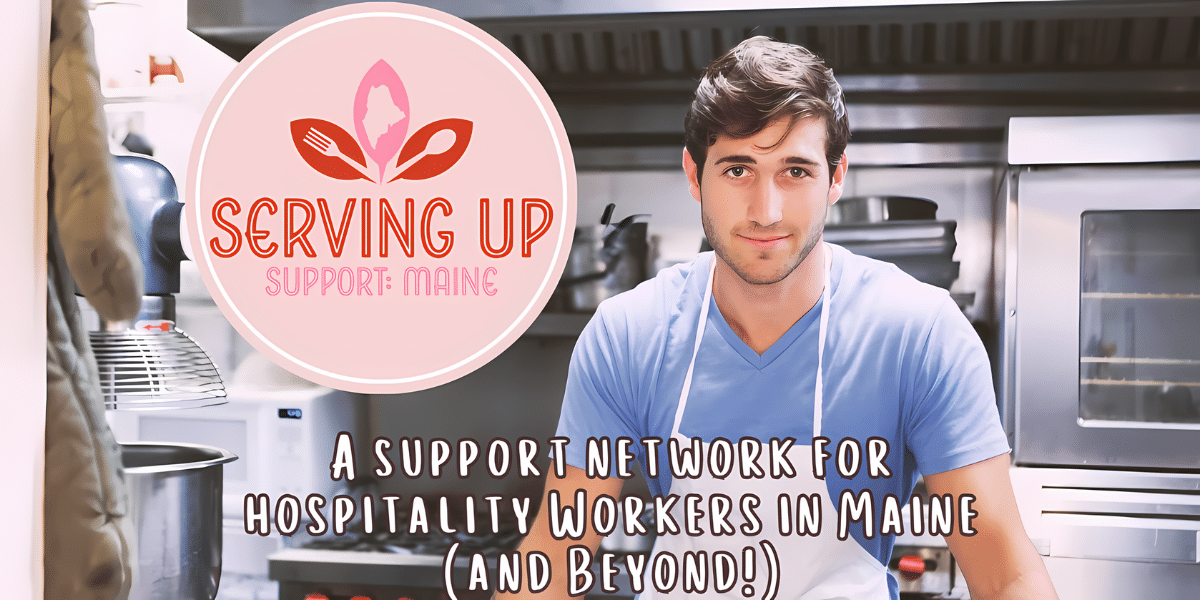By: Jay Feldman
In the bustling world of hospitality, where every service interaction matters and the pace never slows, mental health often takes a backseat. Yet, this industry, known for its high energy and constant demand, harbors a silent crisis: the profound impact of its environment on workers’ mental well-being. With a staggering 30% of new hires exiting within their first three months, as reported by The Burnt Chef Project, it’s clear that the industry’s vibrancy masks deeper challenges. Serving Up Support: Maine is at the forefront of addressing this critical issue, pioneering efforts to weave a safety net for those who make our dining experiences memorable.
The hospitality sector’s allure is undeniable, offering dynamic work settings and opportunities to create joy through service. However, beneath this appealing façade lies a realm fraught with pressures—long hours, demanding physical tasks, and the emotional labor of maintaining composure in high-stress situations. These conditions brew a cocktail of anxiety and depression among workers, contributing to an alarmingly high turnover rate. It’s a stark reminder that while hospitality thrives on offering comfort and care to others, it often fails to extend the same consideration to its own.
Maine is turning the tide through Serving Up Support: Maine—a beacon of hope dedicated to changing how mental health is perceived and addressed within this vibrant industry. Their mission is simple yet revolutionary: “Changing the narrative on mental health in the hospitality industry starts with empathy, understanding, and a commitment to creating supportive environments where every worker feels valued and heard.” This powerful statement encapsulates their approach—building bridges of support that cater to the diverse needs of individuals powering this sector.
Serving Up Support: Maine has crafted an innovative model focused on collecting comprehensive mental health resources tailored for hospitality workers. From crisis intervention and therapy options addressing anxiety and depression to support systems for combating food insecurity and providing financial assistance—their strategy encompasses a holistic view of well-being. Importantly, they recognize that their audience includes not just any one demographic but spans veterans to new parents—all united under the demanding umbrella of hospitality work.
Their digital footprint extends across multiple platforms—Instagram (@servingupsupportmaine), LinkedIn (Serving Up Support: Maine Company Page), Facebook (Serving Up Support: Maine Group), X (@servingupsprtME), alongside their website. Each serves as a portal connecting individuals with resources while fostering community among those who share similar challenges.
What sets Serving Up Support: Maine apart is not just their comprehensive resource pool but also their emphasis on personal growth within professional realms. They understand that empowering employees goes beyond providing job stability; it involves nurturing an environment where individuals can thrive mentally and emotionally.
This initiative reflects a broader need for systemic change across New England and beyond—a call echoed by many within the industry seeking sustainable solutions over temporary fixes. By focusing on preventive measures rather than reactive responses after crises emerge, Serving Up Support aims to lower turnover rates not merely through better job conditions but through healthier work cultures that prioritize employee wellness from day one.
The journey toward reshaping mental health support in hospitality is challenging yet imperative. The high turnover rate signals not just dissatisfaction but distress; it underscores an urgent need for environments where people aren’t merely surviving but thriving. As more establishments recognize this necessity—inspired by models like Serving Up Support—we edge closer towards an industry transformation characterized by resilience instead of resignation.
Serving Up Support’s efforts illuminate paths previously unexplored in addressing mental health within fast-paced work settings. Their dedication provides not only immediate relief for individuals facing hardships but also charts a course towards long-term wellbeing for all who bring life into this sector.
As we contemplate future dining experiences or hotel stays enhanced by impeccable service standards let us remember—the strength of these industries hinges upon those behind-the-scenes whose own stories deserve attention and care. Through initiatives like Serving Up Support: Maine’s revolutionary approach offers both hope and tangible solutions ensuring that no one is left behind in our pursuit of progress within hospitality—and beyond.
Published by: Khy Talara








